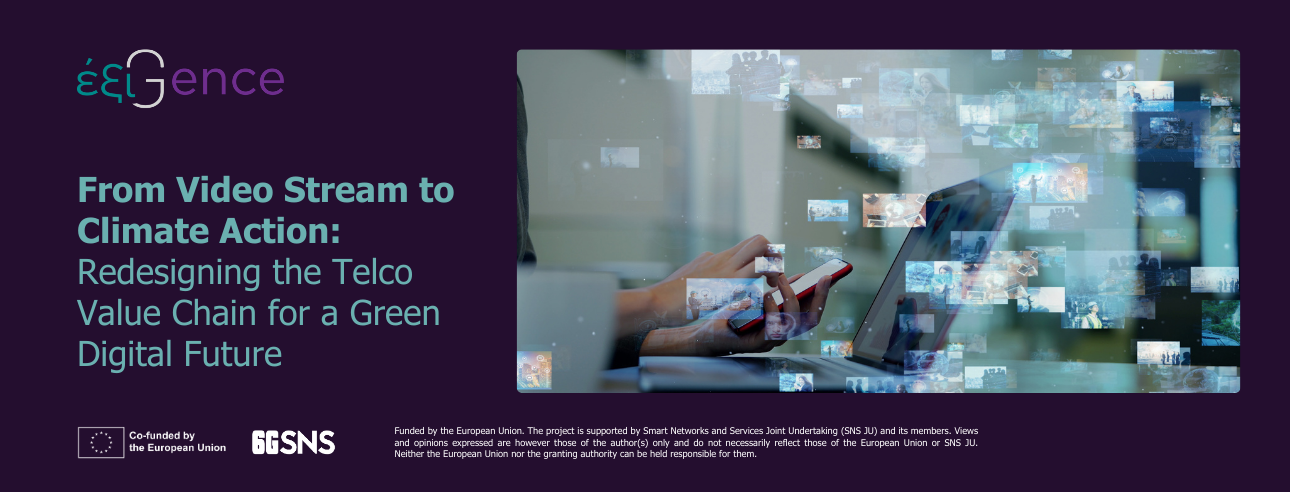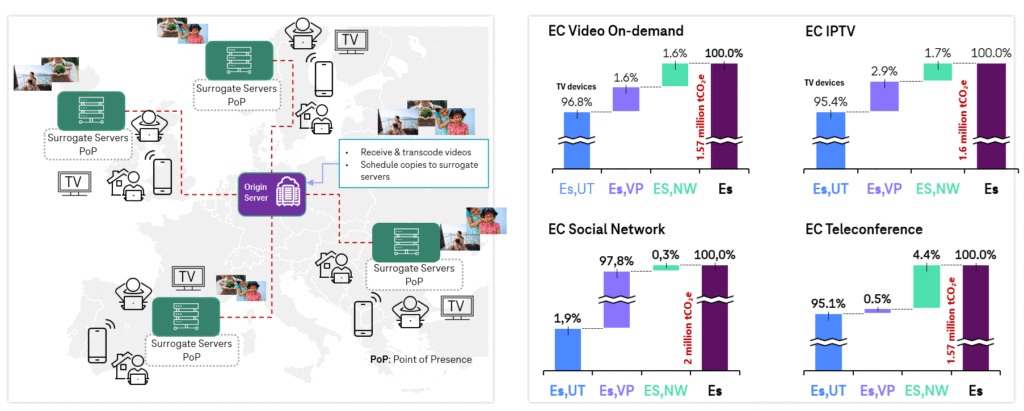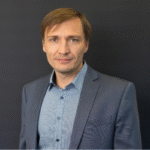
In today’s hyperconnected world, every digital interaction, whether streaming a video, sending a message, or accessing cloud services, leaves behind an invisible trail of energy consumption and carbon emissions. While the telecom and ICT sectors have traditionally focused on backend efficiency, the time has come to shift the lens: toward scalable, user-driven climate action. The future of sustainability lies not just in smarter infrastructure, but in empowering the end-user to become an active participant in the green transition.
Digital Growth vs. Climate Action
As digital services proliferate, so do their environmental footprint. Telecom operators are under increasing pressure from the EU Green Deal, carbon neutrality pledges, and emerging regulations like Scope 3 emissions reporting. Yet, traditional efficiency measures—optimising data centers, networks, and hardware—are no longer sufficient. Sustainability must be systemic. It must extend beyond providers and platforms to include the users who drive demand and shape usage patterns.
User Behaviour as a Climate Lever
The inclusion of end-user into the optimisation loop is not just a technical adjustment, it is a philosophical shift. Users are no longer passive consumers; they are co-optimisers whose choices directly influence the system’s ecological footprint. Figure 1 presents an illustrative analysis of the (relative) energy consumed per domain (i.e., end-user device, Video Provider network, and transmission network), using the model reported in [1] , and associated with four common digital services: Video-on-Demand (VOD), IPTV, Social Network Streaming, and Teleconferencing. The calculations are based on an assumed operator scenario with 100 million end-user devices. Among the services analysed, social network streaming exhibits the highest energy consumption.

Figure 1: Video provider content distribution network (CDN) and (relative) per domain Energy Consumption (Es,UT is the Energy consumed by end-user devices; Es,VP is the Energy consumed by Video Provider CDN; and ES,NW is the energy consumed by the transmission network).
To estimate the carbon footprint the Carbon intensity (also referred to as emission factor, EF) is used. It is defined as the “amount of emissions of carbon dioxide (CO₂) released per unit of another variable such as gross domestic product (GDP), output energy use or transport [3].” For energy systems, this is often expressed as grams of CO₂ equivalent per kilowatt-hour (gCO₂e/kWh). Carbon intensity varies across different regions (e.g., countries or local areas) and fluctuates over time depending on the energy mix and demand patterns. Figure 1 includes the estimated CO₂ equivalent emissions based on a carbon intensity of 417 gCO₂e/kWh registered for Poland in August 2025 [4]. This estimation is used for illustration purposes, as data centers, end-user devices, and transmission networks could be located across different countries and may experience varying carbon intensities during the service viewing time.
Furthermore, imagine a world where users are rewarded for making environmentally conscious choices such as streaming at lower video resolution, switching to energy-efficient devices, or choosing low-carbon networks. As presented in Figure 2, using video-on-demand (VOD) services as an example, there is a substantial reduction in the individual energy consumption and carbon footprint when a user switches from conventional television sets to energy-efficient devices.
Building on this insight, several incentive mechanisms could be envisioned, which project EXIGENCE is exploring in depth to promote sustainable user behaviour.

Figure 2: Energy consumption reduction and Conversion to grams of carbon dioxide equivalent (gCO₂e)
Given the competitive landscape, regulatory momentum, and the escalating impact of climate change, it is no longer enough to optimise existing workflows. It is time to reconstruct the digital value stream. By attributing carbon impact to the service level, EXIGENCE’s MRV and incentive approach can unlock:
- Carbon reattribution: Telecom operators can reassign emissions to users, reducing their own footprint and creating new revenue streams through carbon allowances.
- Eco-data transparency: Users gain visibility into the ecological cost of their actions, enabling informed choices.
- Cross-domain coordination: Energy metrics are exchanged across networks, devices, and services, enabling holistic optimisation.
This creates a cooperative loop where users, providers, and regulators align toward shared sustainability goals.
Business Model Innovation: Sustainability as a Strategy
This shift opens the door to business models that are not only compliant but competitive:
- Green service tiers: Differentiated plans based on eco-performance appeal to environmentally conscious consumers.
- Carbon-aware orchestration: Services are dynamically routed based on energy availability and carbon intensity, reducing emissions without compromising quality.
- Participation in carbon markets: Verified reductions can be traded as offsets, creating new revenue streams for telecoms and ICT providers.
- Regulatory alignment: Initiatives like EXIGENCE support compliance with mandates such as France’s directive to include CO₂ on telecom bills.
Sustainability becomes a strategic asset—not a cost center. Outcomes of the Project EXIGENCE enables a cross-domain, service-level ecodata architecture that allows:
- Fine-grained energy attribution across networks, devices, and services
- Real-time incentive calculation based on carbon intensity and market prices
- Integration with standards bodies like 3GPP, ETSI, and IETF, ensuring scalability and interoperability
EXIGENCE is more than a research project – it is a blueprint for the future of sustainable ICT.
Climate actions can be empowering, engaging, and even rewarding. By turning digital behaviour into carbon savings – and carbon savings into economic value – we create a scalable path to sustainability for users, telecoms, and society at large. In the green digital future, every click counts. And every user is part of the solution.
References
- C. Herglotz, M. Kränzler, R. Schober and A. Kaup, “Sweet Streams Are Made of This: The System Engineer’s View on Energy Efficiency in Video Communications,” in IEEE Circuits and Systems Magazine, vol. 23, no. 1, pp. 57-77, Firstquarter 2023, doi:10.1109/MCAS.2023.3234739
- Statista, “Average daily viewing time of video-on-demand (VOD) in Germany from 2015 to 2023,” Statista, [Online]. Available: https://www.statista.com/statistics/1300249/vod-use-average-daily-duration-germany
- Intergovernmental Panel on Climate Change, Glossary – Special Report on Global Warming of 1.5°C, IPCC, 2018. [Online]. Available: https://www.ipcc.ch/sr15/chapter/glossary
- Electricity Maps, Poland – Live 72h Carbon Intensity Visualization.[Online]. Available: https://app.electricitymaps.com/zone/PL/72h/hourly. [Accessed: Aug. 11, 2025].
EXIGENCE quick survey:
Your feedback is valuable to us! We’re exploring how to empower users to contribute to climate action through their digital habits.
Please take a moment to answer these questions about your potential participation in a program that offers incentives for reducing your digital carbon footprint.
Authors

Detecon International
Dr. Shivam Gupta at Detecon International manages AI, Data Analytics, and Sustainability, leading their digitainability efforts. With over 10 years’ experience, a PhD in Geoinformatics, and over 20 publications, he advises global entities and delivers data-driven solutions. He co-developed “digitainability” and contributes to data-driven sustainability policies.

Detecon International
Marvin Sanchez Garache holds an Eng. degree in Electronics and a Ph.D. from the Royal Institute of Technology (KTH) in Sweden. His extensive career includes roles as a researcher and professor at UNI, a postdoctoral researcher at Glasgow Caledonian University, and various leadership positions in telecommunications across the globe. He is currently a consultant at Detecon, specializing in wireless networks, intellectual property, telecommunication regulation, and Green ICT.

Detecon International
Konstantin Marin is Senior Manager with Detecon International GmbH, Dresden, Germany. With over 15 years of telecommunication industry experience he is DETECON’s technology expert in the Telco Industry Cluster, covering variety of topics in radio access and mobile core including 5G, 6G and Open RAN, and execution projects in the area of sustainability and energy efficiency for mobile operators in Europe and MEA region.
